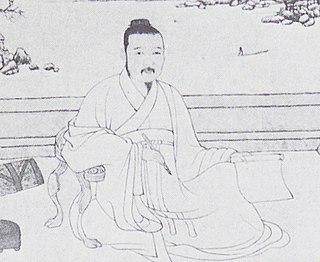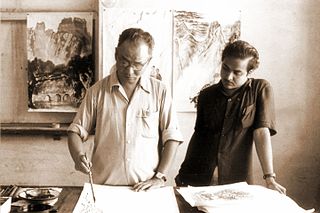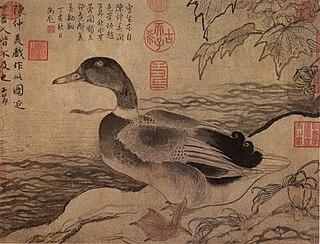Xu Sheng, courtesy name Wenxiang, was a military general serving under the warlord Sun Quan in the late Eastern Han dynasty and early Three Kingdoms period of China.
The 28 Bolsheviks (二十八个半布尔什维克) were a group of Chinese students who studied at the Moscow Sun Yat-sen University from the late 1920s until early 1935, also known as the "Returned Students". The university was founded in 1925 as a result of Kuomintang's founder Sun Yat-Sen's policy of alliance with the Soviet Union, and was named after him. The university had an important influence on modern Chinese history by educating many prominent Chinese political figures. The most famous of these were collectively called the 28 Bolsheviks.

Sheng Xuanhuai was a Qing dynasty Chinese tycoon, politician, and educator. He founded several major banks and universities and served as Minister of Transportation of the Qing Empire. He was also known as Sheng Gongbao.

Ni Zan was a Chinese painter during the Yuan and early Ming periods. Along with Huang Gongwang, Wu Zhen, and Wang Meng, he is considered to be one of the Four Masters of the Yuan Dynasty.
Sheng Xian, courtesy name Xiaozhang, was an official who lived during the late Eastern Han dynasty of China. He was from Kuaiji Commandery, which is around present-day Shaoxing, Zhejiang.
Naval Commandos is a Shaw Brothers film directed by Chang Cheh, who is famous for his martial arts cinematography, but ventured into military combat action with the production of this war movie based upon the War of Resistance/WWII (1937-45).
Life Gamble, also known as Life Combat, is a 1979 Hong Kong Wuxia film directed by Chang Cheh and starring the Venoms, Kara Hui and Alexander Fu Sheng. It was written by Chang Cheh and I Kuang and produced by the Shaw Brothers Studio.

Manual of the Mustard Seed Garden, sometimes known as Jieziyuan Huapu (芥子園畫譜), is a printed manual of Chinese painting compiled during the early-Qing Dynasty. Many renowned later Chinese painters, like Qi Baishi, began their drawing lessons with the manual. It is an important early example of colour printing.
Li Sheng was a Chinese landscape artist. His brush painting Saying Farewell by the Lake Dianshan is popular in the west, as exemplified by its widespread availability.
The 9th Central Committee of the Communist Party of China was in session from 1969 to 1973. It held two plenary sessions in the 4-year period.
The Politics of Hunan Province in the People's Republic of China is structured in a dual party-government system like all other governing institutions in mainland China.

Li Keran, art name Sanqi, was a contemporary Chinese guohua painter and art educator. Considered one of the most important Chinese artists in the latter half of the 20th century, he was also an influential professor at the Central Academy of Fine Arts where he taught a generation of Chinese artists. Although trained in Western oil painting, he was known for his traditional literati paintings with influences from Qi Baishi and Huang Binhong, two renowned masters in Chinese painting.
Sheng Maoye ; was a Chinese landscape painter during the Ming Dynasty (1368–1644). His specific dates of birth and death are unknown.

The Sheng Jing (盛京) Hospital was founded by Dugald Christie (missionary) (1855-1936), a Scottish missionary doctor in 1883. It was the base on which the Mukden Medical College was formed, also by Christie, in 1912. In 1949 the Mukden Medical College was absorbed by the China Medical University and the hospital became known as the 2nd Affiliated hospital of the China Medical University. In 1969 it was moved, by Chairman Mao, to Chaoyang but returned to Shenyang in 1983. In 2002 the hospital took over the Third Affiliated Hospital of the China Medical University and set up the Huaxiang Campus. In 2003, on the 120th anniversary of its founding, it restored the name as Shenjing Hospital. It is situated near the famous San Hao Jie 三好街. The Hospital is one of the largest hospitals in the city of Shenyang, Liaoning Province. Its motto is "United and dedicated; Disciplined and responsible; Caring and trustworthy; Professional and innovative."
CTS Main Channel is a free-to-air terrestrial television channel of the Chinese Television System network and is the third oldest free-to-air terrestrial television channel in the Republic of China (Taiwan) after TTV Main Channel and CTV Main Channel.
Zang Maoxun was a Ming dynasty Chinese playwright and drama theorist from Changxing, Zhejiang province. His courtesy name was Jinshu (晋叔) and he may also be known by the pseudonym (hao), Guzhu (顾渚). He successfully achieved the rank of Jinshi in 1580. He was matriculated as a local governmental official in Jingzhou, and was later promoted as an officer in Guozijian (国子监) of Nanjing. He knew the Confucian Five Classics well and was a person uninhibited in speech and behavior. Zang disdained the feudal ethical code and was dissatisfied with affairs of the state. As often pointed out the political problems in the society in the way of poetry at the moment, he was impeached by the imperial court and dismissed from office in 1585. After returning to his hometown, Zang entertained himself with poetry and remained an intimate association with many men of letters. He collected the missing yuanqu and poems. He also published a lot of books, including Selections of Yuanqu, Selections of poems which granted him lasting fame for posterity.

Sheng is the Mandarin pinyin and Wade–Giles romanization of the Chinese surname written 盛 in Chinese character. It is romanized as Shing in Cantonese. Sheng is listed 146th in the Song dynasty classic text Hundred Family Surnames. As of 2008, it is the 175th most common surname in China, shared by 700,000 people.
Cai Han, was a Chinese landscape painter. She was the concubine of the painter Mao Xiang and, with his other concubine Jin Yue, she was commissioned by him with the task of producing paintings as gifts to his guests; they became known as "The Two Painters of the Mao Family".
Sheng Tongsheng or Tung-sheng Sheng was a Chinese veterinary physician and microbiologist. Sheng was also made contribution to veterinary education, he was the first president of the first independent college of veterinary medicine in China, he is considered as one of founders of modern Chinese veterinary medicine.











